6 Secrets to Navigating the Farmers Market Successfully, According to Farmers
Read these tips from farmers around the country before breaking out your market tote.
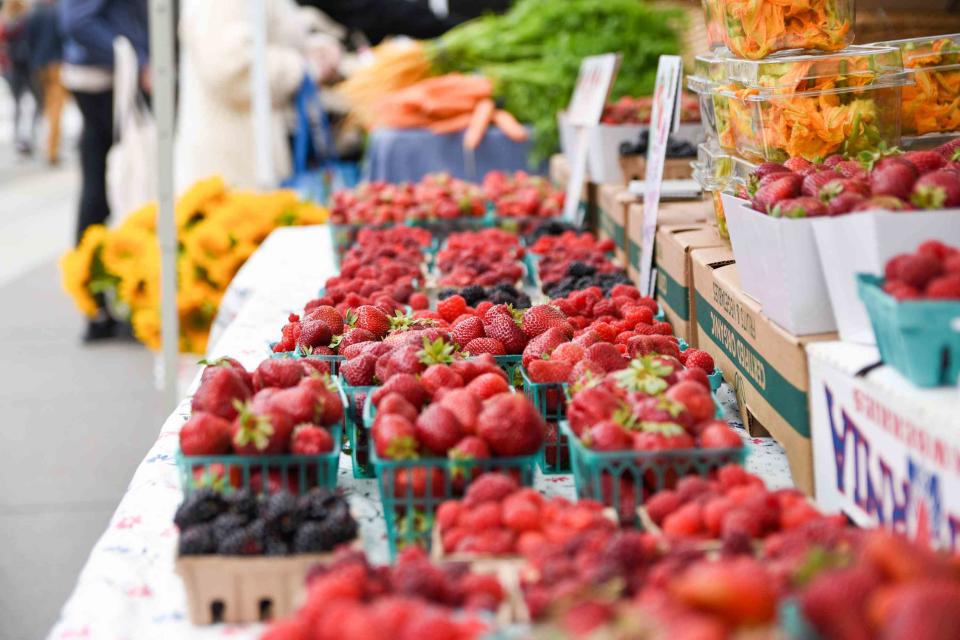
Foodwise
Whether you’re close to home or traveling, there’s no better way to acquaint yourself with the microclimate of a city or town than to hit up one of its weekly farmers markets. Considering the sheer variety and scale of markets on offer, you might have some questions. Is it better to go early in the day for the choicest vegetables? Should you bring a shopping list, or freewheel it without a plan? When’s the best time to chat up a farmer about recipe ideas? To help answer these questions, we went right to the source, recruiting four farmers from around the country to share their best tips for navigating the farmers market this season.
Early birds get the best produce
It’s by now well-documented that if you’re after the most coveted, peak-season ingredients, the ideal time to come to the farmers market is within an hour of opening. If you’re new to this practice, though, you might feel akin to the novice in a TSA precheck line full of business travelers at the airport.
“If you’re coming in the first hour of the market, that’s going to be the time when things are more all business,” says Prentice Onayemi, co-owner of Foglight Farms, a BIPOC-owned farm in Hillsboro, Oregon, found at Portland’s year-round Portland State University Farmers Market, King Farmers Market, and the Hillsboro Farmers’ Markets. “There are those regulars that have their specific circuits, and that’s when chefs are there to make sure they get what they need ASAP.”
However, the market can still check a box for folks seeking a more leisurely, social experience, as business will ebb and flows throughout the day based on weather. “Don’t feel pressured to match the pace of those around you,” says Onayemi.
"Our regular customers will ask specific questions to create a menu or meal plan [for the following week]. ‘Are you going to have anything different next week? Are the quantities limited? Do I need to get there early?’ That’s really helpful."
— Sam Zurofsky, co-owner of Long Season Farm
Indeed, you can take an early-morning lap with your coffee to get the lay of the land, then come back around a second time to buy. If you’re new to a market or a city, bring a more seasoned friend along. Or, pop by in the afternoon, when things are more chill and farmers are available for a leisurely chat. You can even use this time “to make a game plan” for next week, says Onayemi.
Sam Zurofsky, co-owner of organic vegetable farm Long Season Farm in Kerhonkson, New York, which sells at the nearby Kingston and Beacon farmers markets, agrees.
“One thing we’ve observed our regular customers doing that we think is great is they’ll ask us specific questions to create a menu or meal plan [for the following week],” he says. “Questions like, ‘Are you going to have anything different next week? Are the quantities limited? Do I need to get there early?’ That’s really helpful.”
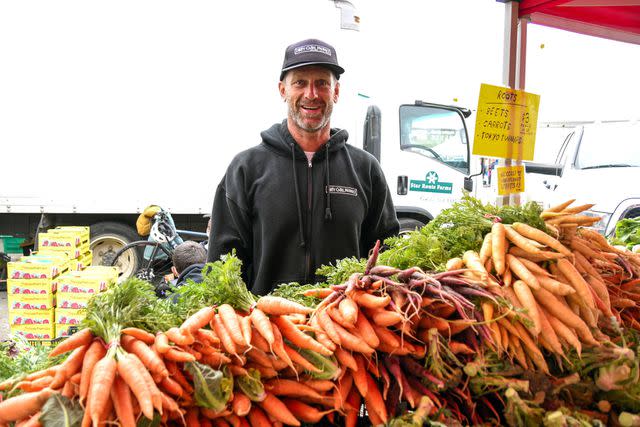
Foodwise
Dirty Girl Produce owner Joe Schirmer at the Ferry Plaza Farmers Market in San FranciscoLeave the list at home
To grow and eat seasonally is to embrace the unpredictability of Mother Earth. Don’t see the Little Gem lettuce you were counting on? “We got butter lettuce,” quips Joe Schirmer, farmer and owner of certified organic farm Dirty Girl Produce in Freedom, California, which sells produce and dry goods at five Bay Area markets, including the Ferry Plaza Farmers Market.
Look for the positive side of missing out on what you came for, says Schirmer — that you’ll add a new tool to your cooking toolbox by trying a new ingredient. “Knowledge is power,” he says. “Plus, it’s hard to beat that standard of freshness with what you get at the market.”
Long Season Farm market manager Allison Patrick agrees, noting that it’s generally better to come with a broad list or none at all.
“Often people end up disappointed if they’re trying to follow a recipe,” says Patrick. “The whole, ‘I thought things would be here by now,’ is not guaranteed. Come with an open mind or open plan, and be willing to work with what farmers have for sale, and you’ll leave happier.”
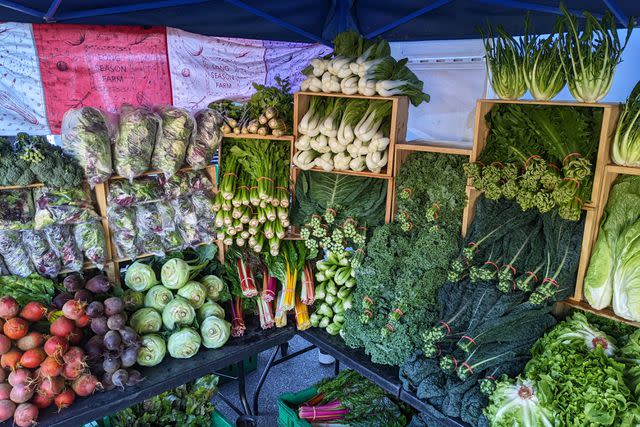
Sam Zurofsky / Long Season Farm
Produce on display from Long Season Farm in Kerhonkson, New YorkResist the urge to rifle through produce
One of Michigan farmer Tim Frillman’s biggest pet peeves is when people rummage through piles of produce, as if at the grocery store. Frillman owns Frillman Farms in Berrien Springs, Michigan, which sells produce, eggs, and honey at Chicago’s Green City Market and Logan Square Farmers Market.
“For some reason, [customers] think it’s the grocery store with the best stuff on the bottom, which doesn’t make sense because it’s all picked at the same time,” says Frillman.
Schrimer will group items by size on his displays to discourage rifling. Others have gone so far as to assume control of most of the picking, like Long Season Farm, which started this practice during the pandemic.
Related: 15 Overripe Foods to Cook Instead of Throw Away, According to Chefs
“Ours is a little more cafeteria-style, where customers are coming up to the counter, and we have a display, but we’re doing most of the fetching of items,” says Zurofsky. “We do put some stuff accessible that’s okay with getting a little more jostled. In general, it is bad manners to be too handsy with things that you’re not going to buy.”
The same goes for commenting on prices directly to, or within earshot of, farmers.
“These are livelihoods and lives,” says Frillman. “Saying something like, ‘Oh my god, you’re charging a dollar a beet?’ is disrespectful. I’m proud of my prices; I charge what I charge because I actually grow it. If the customer is not happy, that’s what’s awesome about a market. There are many other choices.”
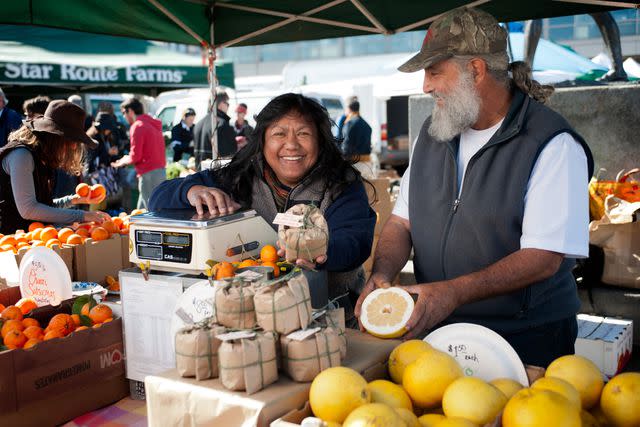
Gary Yost Photography / Foodwise
Vendors at the Tory Farms stand at the Ferry Plaza Farmers MarketEngage farmers — mindfully
There’s a reason farmers choose to participate in markets, which for the most part aren’t financially lucrative. “We’re not just there to move a ton of product,” says Onayemi. “If that was the goal, there are other ways. I’m doing it because I love collaborating with nature in this way and sharing it with others; it’s about connection.”
Find a friendly face behind a counter and say hello. Ask what produce is having its moment right now or what farmers themselves are excited to cook with this week.
“We like when people share what they are curious or excited about,” says Zurofsky. “We’ll get questions about how we grow something or why we grow this, not that. They’re often kind of unexpected perspectives, and we learn from our customers through them.”
"There’s a reason farmers choose to participate in markets, which for most aren’t financially lucrative. We’re not just there to move a ton of product. If that was the goal, there are other ways. I’m doing it because I love collaborating with nature in this way and sharing it with others; it’s about connection."
— Prentice Onayemi, co-owner of Foglight Farms
If vendors look busy or lines are long, keep your questions specific, rather than starting open-ended conversations. “How much broccoli do I need for 10 people?” “Is puntarelle a chicory?” “Do you have a good substitute for kale?” “Do you have tomatoes that will still be good five days from now?”
One of the best ways to get to know farmers, their product, and their ethos is to follow them on social media or sign up for the email list on their website.
“You can see the whole picture of what’s going on on a farm, like why does Frillman Farms have tomatoes in April? Because we invested in a 500,000-BTU heater that literally made us able to have tomatoes at the market in spring — a lifelong goal of mine,” says Frillman.
Subscribing to your regular farmers market’s newsletter is another great way to keep on top of what’s new, and who’s in and out on a given week, Schirmer adds. “Even so, they don’t hit everything. The only way to dial into that is to have that early market routine.”
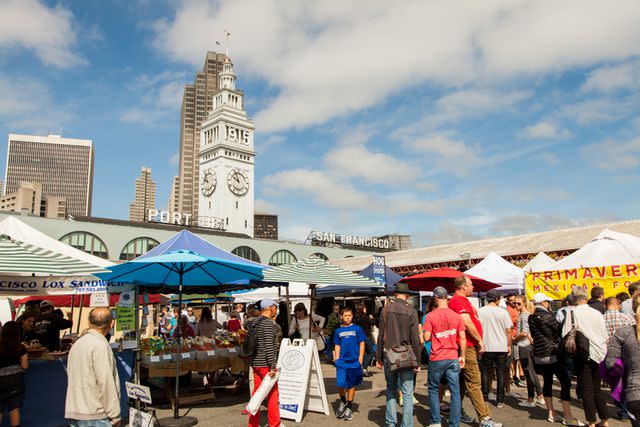
Amanda Lynn Photography / Foodwise
The Ferry Plaza Farmers Market in San Francisco is open year-round on Tuesdays, Thursdays, and Saturdays.Bring plenty of bags and cash
Before you leave the house, Schirmer recommends prepping your bags so you’re not scrambling when you get to the front of the line at the market. Place a few plastic produce bags, smaller cloth bags, or even gently rolled-up kitchen towels (which Schirmer likes using as dividers between heartier items like artichokes and squashes) inside larger shoulder bags.
“When you roll up and have your canvas shoulder bag and you pull out a smaller canvas bag, we see it, we appreciate it,” he says. “We’re all doing this together.”
Even as more cities like San Francisco phase out plastic bags, Schirmer notes that those still in circulation can and should be reused for market produce. “You can wash plastic bags, especially if all you’re putting in there is lettuce,” he says. “We’re so conditioned that they’re single use.” Rinse them, turn them inside out, and hang them to dry; Schirmer hangs them on clothespins above the sink.
While in line, also check for card readers or signs that say “cash only,” and make sure you have your money ready when you get to the front.
Related: This Farmers Market in Miami Sells Some of the Hardest to Find Produce in America
Really want to support farmers? Head to the market on a rainy day
Every farmer we interviewed encourages shoppers to get out in all kinds of weather to support the market.
“Get a pair of rain boots that look cool on you and some rain pants and a jacket,” says Schirmer. “Go on a rainy day when no one’s there. People will love you!”
Especially for small farms that sell primarily through farmers markets, bad weather can have a big impact on sales, particularly since most farms have tight operating margins. “It brightens our day too,” says Patrick. “We’re out there in the bad weather. It really can make us feel good.”
For more Food & Wine news, make sure to sign up for our newsletter!
Read the original article on Food & Wine.

